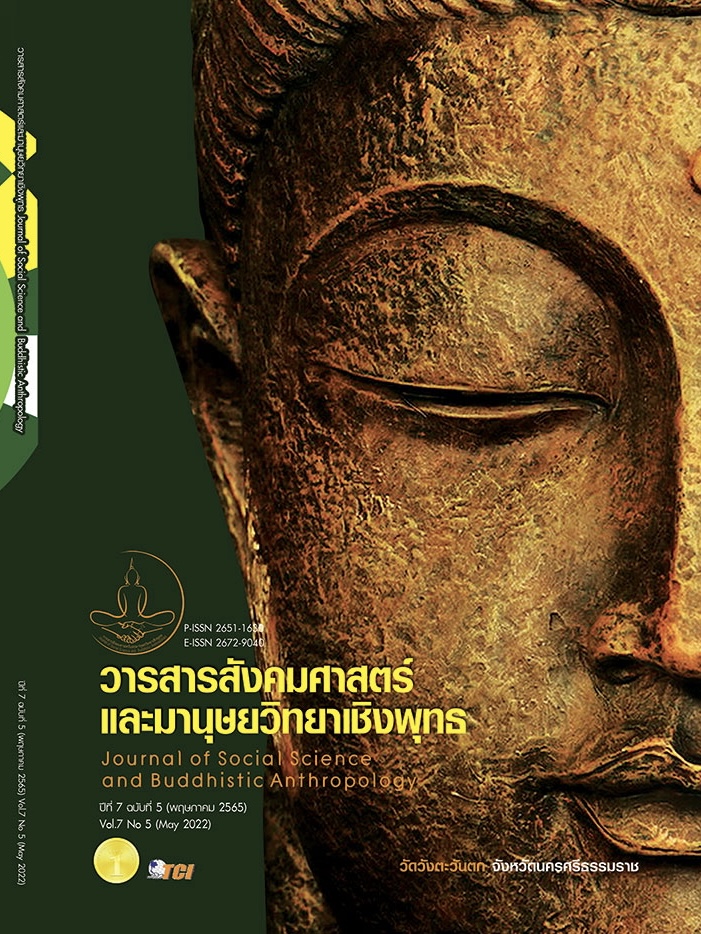CAUSAL FACTORS INFUENCING SUBJECT RESEARCH LEARNING ACHIEVEMENT OF PRE-SERVICE OF SURIN RAJABHAT UNIVERSITY
Keywords:
Achievement, Factors, Pre-ServiceAbstract
The objectives of this research article were to examine the causal factors influencing the subject research learning achievement of pre-service at Surin Rajabhat University. A quantitative research methodology was used in this research. The population of pre-service. Bachelor's degree, regular semester, 3rd and 4th year, Surin Rajabhat University, the academic year 2021, 1,582 people. The samples consisted of 204 pre-service of Surin Rajabhat University, which were selected by cluster sampling. Five causal variables include the quality of teaching, awareness of the use of technology, attitudes towards research subjects, motivation for achievement, and willingness to study. The dependent variable was the achievement of research subjects, semester 1, the academic year 2021. The research instruments were the 5 rating scale questionnaires. Percentage, average, and standard deviation were statistics used to perform analysis. Path analysis using the prepackaged program LISREL 8.80. The research result found that The factors that directly influenced the achievement of research subjects were the willingness to study, which had an influence value of 0.26 with statistical significance at the .05 level. Factors that directly and indirectly influence research achievement include attitudes towards research subjects, quality of teaching, and motivation for achievement, which had influence value of 0.87, 054 and 0.96 respectively, and factors that indirectly influence academic achievement was awareness of the use of technology which had influence value of 0.30 with statistical significance at the .05 level. All causal factors could explain the variance of subject research learning achievement at 84.00%.
References
จุฑามาศ ศรีจำนงค์. (2561). การประเมินความต้องการจำเป็นในการพัฒนาตนเองในการทำวิจัยในชั้นเรียนของนักศึกษาวิชาชีพครู มหาวิทยาลัยราชภัฏเลย. วารสารศึกษาศาสตร์ มหาวิทยาลัยมหาสารคาม, 12(2), 31-42.
ทิพวัลย์ เรืองเดชสิริพงศ์. (2561). ปัจจัยเชิงสาเหตุที่ส่งผลต่อความสำเร็จในการศึกษาระดับปริญญาตรีของนักศึกษา มหาวิทยาลัยสุโขทัยธรรมาธิราช. ใน วิทยานิพนธ์วิทยาศาสตรมหาบัณฑิต สาขาวิชาวิจัย วัดผลและสถิติการศึกษา. มหาวิทยาลัยบูรพา.
นงลักษณ์ วิรัชชัย. (2542). โมเดลลิสเรล: สถิติวิเคราะห์สำหรับการวิจัย. (พิมพ์ครั้งที่ 3). กรุงเทพมหานคร: จุฬาลงกรณ์มหาวิทยาลัย.
ประกาศคณะกรรมการคุรุสภาเกี่ยวกับมาตรฐานความรู้และประสบการวิชาชีพครู. (2563). ราชกิจจานุเบกษา เล่มที่ 137 ตอนที่ 109 ง หน้า 10 (7 พฤษภาคม).
ปรียาพร วงศ์อนุตรโรจน์. (2546). จิตวิทยาการศึกษา. กรุงเทพมหานคร: ศูนย์สื่อเสริมกรุงเทพ.
ปัญจา ชูช่วย. (2551). ปัจจัยเชิงสาเหตุที่มีอิทธิพลต่อผลสัมฤทธิ์ทางการเรียนของนักศึกษาปริญญาตรี มหาวิทยาลัยสงขลานครินทร์ วิทยาเขตปัตตานี. ใน วิทยานิพนธ์ศึกษาศาสตรมหาบัณฑิต สาขาวิชาการวัดผลและวิจัยการศึกษา. มหาวิทยาลัยสงขลานครินทร์.
พิมพ์ปวีณ์ สุวรรณโณ และปราณี หลําเบ็ญสะ. (2562). ผลการใช้รูปแบบการเรียนการสอนแบบห้องเรียนกลับด้านด้วยการเรียนรู้ที่ใช้การวิจัยเป็นฐานของนักศึกษาชั้นปีที่ 4 มหาวิทยาลัยราชภัฏยะลา. วารสารมหาวิทยาลัยราชภัฏยะลา, 14(1), 1-10.
พูลพงศ์ สุขสว่าง. (2560). โมเดลสมการโครงสร้าง. ชลบุรี: เอ.พี. บลูปริ้นท์.
ภักดิ์วิภา สมเพ็ง. (2558). ปัจจัยเชิงสาเหตุที่มีอิทธิพลต่อผลสัมฤทธิ์ทางการเรียนวิชาภาษาอังกฤษของนักเรียนชั้นประถมศึกษาปีที่ 6 สังกัดสำนักงานเขตพื้นที่การศึกษาประถมศึกษายโสธร เขต 1. วารสารวิจัยและประเมินผลอุบลราชธานี, 4(2), 31-43.
วัฒนาพร ระงับทุกข์. (2542). การจัดการเรียนการสอนที่เน้นผู้เรียนเป็นศูนย์กลาง. กรุงเทพมหานคร: เลิฟแอนด์เลิฟเพรส.
สุชาติ หอมจันทร์ และคณะ. (2561). ปัจจัยที่ส่งผลต่อผลสัมฤทธิ์ทางการเรียนวิชาวิจัยการศึกษา คณะครุศาสตร์ มหาวิทยาลัยราชภัฏบุรีรัมย์. วารสารบริหารการศึกษาบัวบัณฑิต, 18(1), 93-102.
อภิภา ปรัชญพฤทธิ์. (2560). การพัฒนารูปแบบการผลิตครูเพื่อรองรับยุค 4.0. วารสารร่มพฤกษ์มหาวิทยาลัยเกริก, 35(3), 114-136.
Anastasi, A. (1970). Psychological Testing. New York: McGraw-Hill,Inc.
Bloom, B. S. (1976). Human Characteristics and School Leaning. New York: McGraw z Hill Book.
Chu, A. Z-C. & Chu, R. J-C. (2011). The intranet’s role in newcomer socialization in hotel industry in Taiwan-technology acceptance model analysis [Electronics version]. The International Journal of Human Resource Management, 22(5), 1163-1179.
Hair, J. F. et al. (2010). Multivariate data analysis: A global perspectives. Upper Saddle River, New Jersey: Pearson Education, International.
McClelland, D. C. (1953). Human Motivation. New York: Cambridge Univerity Press.
Downloads
Published
How to Cite
Issue
Section
License
Copyright (c) 2022 Journal of Social Science and Buddhistic Anthropology

This work is licensed under a Creative Commons Attribution-NonCommercial-NoDerivatives 4.0 International License.









